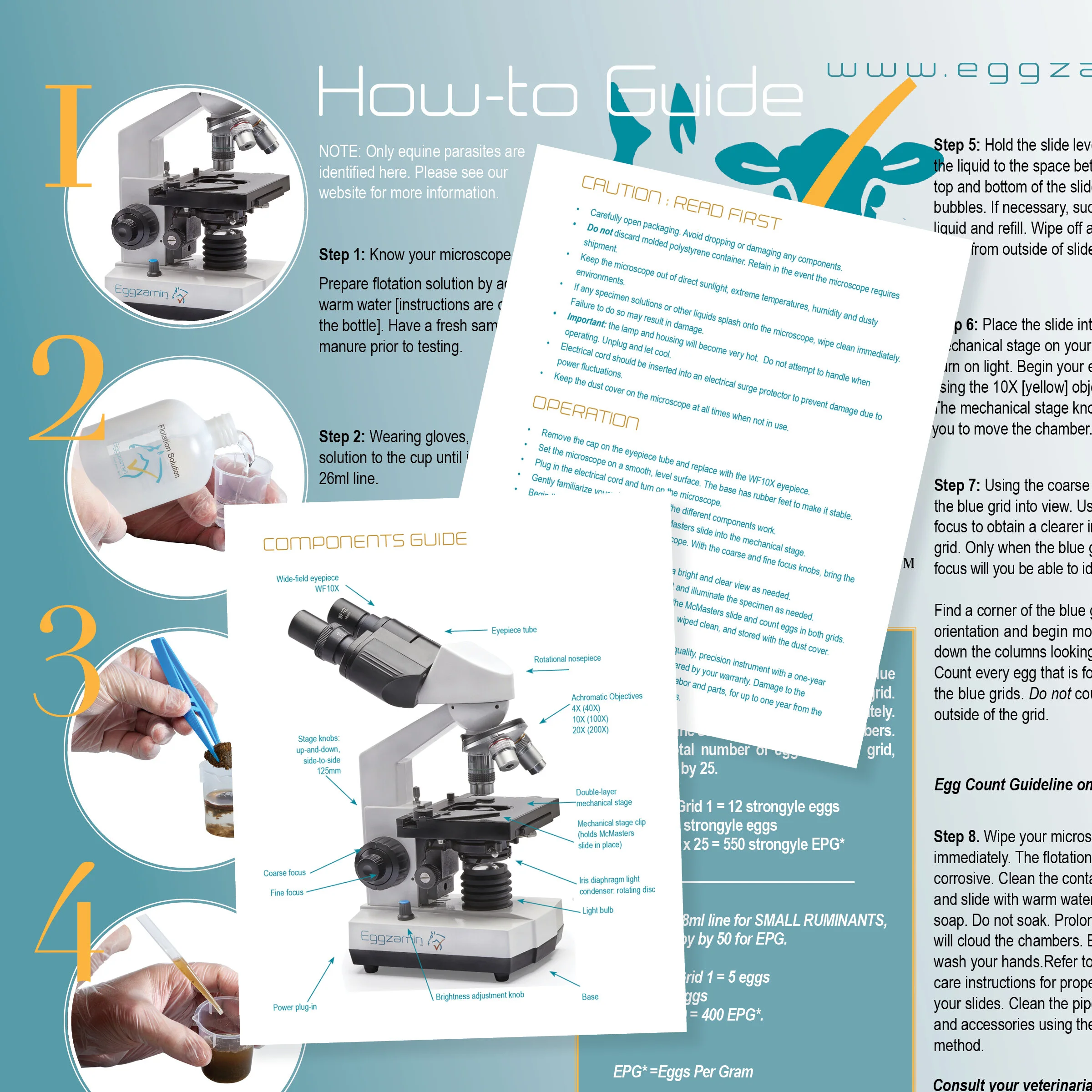The Test
The Eggzamin kit was designed to make the Fecal Egg Count process quick and easy. Our specialized kits provide everything you need to conduct unlimited McMaster Method Fecal Egg Counts. This common test used by veterinarians and labs all over the world gives you a quantitative (how many?) verses a qualitative (are there eggs?) count of how many parasite eggs are being shed per gram of feces. Our customized equipment and instructions will help you accurately perform the test and identify parasite eggs to make educated deworming protocols.
A Fecal Egg Count (FEC) test uses a microscope to examine parasite eggs in fresh manure. This simple test can indicate which parasites are present and how many are there. Adult parasites lay eggs that are passed through the feces. This is what we are counting.
PARTNERING WITH YOUR VETERINARIAN
The goal of frequent FEC testing is not to eliminate your veterinarian’s visits! On the contrary, the power of collaboration is the goal. The more accurate your assessment, the more targeted your treatment.
This is for the benefit of your farm as a whole, and for the environment at large, as well as your livestock.
Your vet is trained in management of equine parasites, epidemiology, risk factors, clinical signs of disease, parasite life cycles, effects of climate and environment, and the fight against anthelmintic resistance. Eggzamin’s® FEC Test Kit can provide accurate information in minutes, not days, and over time, can give you a more precise picture of which animals are in need of intervention and which aren’t.
THE EGGZAMIN® METHOD
Egg Counting Procedures (Quantitative Fecal Analysis)
The most common method of determining Fecal Egg Counts (FEC) is the modified McMaster technique which is used by Eggzamin® and many of the leading diagnostic labs around the world and has been the standard for obtaining Fecal Egg Counts in grazing animals for decades. Although there are several variations of how this is done, the basic method uses a weighed fecal sample, a known dilution in the flotation solution, and a specialized counting slide to count the eggs. The principle uses of quantitative FEC’s are to evaluate drug efficacy and potential drug-resistance.
When performing the Eggzamin® modified McMaster FEC you are examining 1% of the sample, meaning each egg observed within the grid actually represents 100 eggs in the entire mixture. Since you started with four grams of feces, you must divide this number by four to report the results correctly in eggs per gram – or simply multiply the number of eggs counted by 25.
Here are a few of the labs utilizing the the modified McMaster technique:
IDEXX, Auburn University, University of California, Davis, Texas A&M University at College Station, Penn Veterinary Medicine – PADLS laboratories, Texas Veterinary Medical Diagnostic Laboratory, Kansas State Veterinary Diagnostic Laboratory, University of Florida Veterinary Diagnostic Laboratories, Iowa State University College of Veterinary Medicine, North Carolina Veterinary Diagnostic Laboratory System.
We’ve made it easy – learn how to conduct a Fecal Egg Count with Eggzamin.
Testing Checklist:
You have your Eggzamin® kit
Your flotation solution in your kit is prepared
You are familiar with your microscope
You have a fresh manure sample
You have a workspace and a paper towel handy
You are ready to test!
“Host-parasite relationships have been going on for several hundreds of thousands of years, with continuous adaptation on both sides,” says Dr. Hubertus Hertzberg. And there’s nothing wrong with that, says Dr. Martin Nielsen. “Parasitism is a normal state,” he says. As Hertzberg explains, these host-parasite relationships are “never-ending competitions,” but they’re certainly not battles. “It’s not like there’s a winner and a loser at the end,” he says. “It can’t be the goal of a parasite to beat its host because that would mean his end, as well.” ”
“I never felt right treating something I couldn’t see, and I always suspected my horses didn’t need to be wormed as often as recommended. Now I have my own FEC lab and Eggzamin has helped me learn to do the test and identify parasites. I can test my horses to determine if they need treatment, and I am finding that they need it much less frequently!
”


